Staff Editorial: Addressing ongoing cycles of inadequate support for women’s sports at Fossil
Players on the Girls Varsity Basketball team during a game against Fairview High School.
Picture it: your team is depending on you for a tie breaking point. It’s a lot of pressure, but you’re up for the challenge. Whether you kick, punt, or throw, you make it. The crowd goes absolutely wild. Or does it?
Sometimes you do make that winning point, and you look around to celebrate, and are met with an empty gym. The win doesn’t seem to feel as good as it did before.
For countless years, being met with empty stands after hard earned wins has been the harsh reality that our female athletes have dealt with. Even when they go against some of the top teams in the state, the Fossil Ridge High School community fails to support and recognize all the hard work our female athletes put into their sports.
What contributes to this ongoing cycle of inadequate support? Lack of support for female athletes is an issue with layers and complexity that may not be so obvious at first glance. Fighting for support also requires making difficult decisions like going against tradition and mob mentality, confronting subconscious misogynistic beliefs, and redefining what it means to be a sports fan.
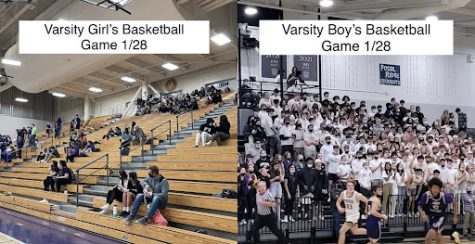
Sports crowds bring together all sorts of diverse attendees, ranging from students, families, sports fans, cheerleaders, band members, and more. These spectators help bring liveliness and spirit to a game, “when there’s a lively crowd there and they’re positive. It’s definitely an asset to the home team. It’s an advantage,” said Fossil’s Athletic Director, David Walck.
A big crowd shows to players that their hard work is being recognized and celebrated. What is the reasoning behind the absence of these groups when it comes to supporting female sports?
Students have explained that their reasoning for not attending women’s sports games is for the lack of publicity and advertising they receive. Many students explained that they are unsure when and where many of these sporting events take place.
“I think there’s multiple different reasons, but I think marketing could be a big part… no one ever really knows when there’s women’s games going on,” said senior Charlie Steensma, on the issue.
A senior on the Girls Varsity Basketball team, Jessica Rockwell, agrees with the need of marketing for her team.
“Boys get advertised more, nobody ever hears about the girls’ games and you don’t get anybody to come out for that,” said Rockwell.
But some players on the Varsity Girls Basketball team believe that their marketing is not necessarily the stem of the issue.
“Every night before our game, we always post on our social media for everyone. And we give the time and locations,” said Maddie Kohler, a senior on the Girls Varsity Basketball team.
However, watching the game is not even the main focus for some attendees.
“I go for the social aspect of it,” said junior Molly Wulff. “I feel like yes, I’m supporting people on the court or on the field. But being able to see the game with my friends is important to me. It’s just an extra level of fun to hang out and stuff… sometimes when our friends are playing it just makes it even more fun.”
In recent years, social media has become a huge outlet to spread news about sporting events. Because of this, students have begun to rely heavily on social media posts to determine which games they should go to. Mia Shanley, a senior, who helps run @frhsbarstool, an Instagram account that sends updates out about Fossil sporting events, explains that a major reason they don’t post about girl’s games as much as boy’s games is because she does not know when they are.
All the information for any Fossil sporting event can be found on Fossil’s website under “Athletics” or using this link. These resources provide dates, times, and locations for both home and away games. Etched in Stone also provides weekly reminders for upcoming events on our sports Instagram page, @sabercatsports.
Inequalities can be observed even from the way that followers have interacted with social media posts. On Sabercat Sports, posts regarding boy’s sports receive an average of 65.8 likes per post, while girl’s sports receive an average of 27.6 likes per post.
The information about all events are provided equally however, the distribution of the information is unequal. Since most students hear about Fossil sporting events from other students or social media posts with a skewed preference towards boy’s sports, the general student body doesn’t speak about women’s events. Resulting in the attendance numbers continuously decreasing.

The crowd is the heart of the sport’s arena. It drives players to do better, because the game stops being about just them, and starts becoming about the people they play for. To Tyler Brown, a junior on the Varsity Boys Basketball team, a full crowd helps him stay motivated to play.
“There’s pressure to perform just because you want to look good in front of your peers but also it’s a bit of that extra support, like people always motivating [you].” said Brown.
When it comes to the absence of the crowd at Girl’s Basketball games, even Matt Johannsen, the coach of the Varsity Boys Basketball team and a diehard basketball fan, is unsure why that is.
“I wouldn’t say it’s different. I mean, basketball is basketball, right? You know, I don’t know why. Maybe it’s the quickness of the game… But I’ve been to plenty of women’s games. At the high school level, the collegiate level, even at the pro level, it was good basketball. I don’t know why more people aren’t watching,” said Johannsen.
Jamie Menefee, the coach of the Varsity Girls Basketball team is also unsure of the origins of this issue, but feels strongly that the way that these issues are kept alive may go beyond the student body but rather Fossil’s own organizations failing to show support.
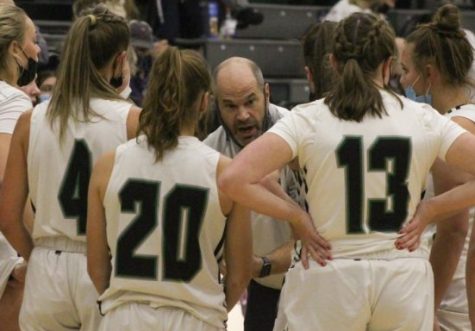
“I want to make sure that you print this part. I know that all the different groups, organizations, cheer, band, every activity, every sport has their own things going on and they have their own seasons and their own competitions. And we’re no more important than any of those. That being said, the doubleheader [on] Friday, we played a really good game. We had senior night, we won our crosstown rival, and I go in the team room afterwards and the girls were talking about, ‘did you notice the band showed up right after our game to be there for the boys game. Did you notice we had the JV cheer squad. They had the varsity cheer squad.’ So although I know that it’s possible that those other groups had, you know, different things going on and so, you know, they shouldn’t schedule us over their things and I get that. As far as the girls are concerned they took it personally and it was a slap to the face to not have the support that the boys got,” said Menefee.
This doubleheader game, mentioned by Menefee, was on February 4, against Poudre High School. This game was a meaningful win for the Varsity Girls Basketball team, resulting in a score of 49-22.
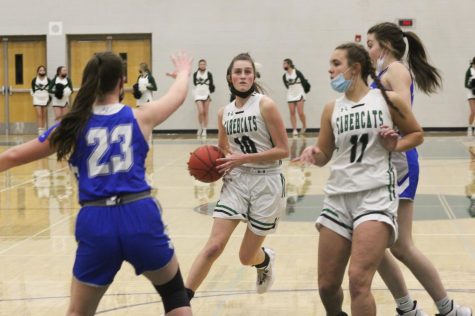
Walck explains that he thinks the absence of these groups are not necessarily because of negative misconceptions about women’s sports, but rather a lack of practice space.
“What a lot of people don’t understand about cheerleading is they say, ‘Oh, well, the cheerleaders just don’t want to come.’ Now, that’s not the case. Because [our] gyms are full with basketball right now. Right? And wrestling. So our girls have no place to practice, they have to go to outside facilities. And then those outside facilities determine what time they can be there… a lot of people bash cheerleaders for that, and I struggle with it,” said Walck.
This year, Walck has been brainstorming a wide array of new incentives for people to come to more women’s sporting events, a huge one being a drastic split in Fossil’s cheer team.
Effective next year, Fossil’s Athletic Department has made the decision to have two separate cheer teams: the spirit squad and the competitive cheer team. Walck explains that the spirit squad will be a team that focuses more on just promoting school spirit, for they will only cheer on the sidelines at Fossil’s sporting events. The competitive cheer team will include more tumbling and participate in competitions, similar to our current cheer team. The spirit squad will cheer all year long, both for fall and spring sports. Cheerleaders in both teams will still have the opportunity to be awarded a letter.
Some ideas Walck has for incentivizing more people to attend women’s games include purchasing a new television and testing out some crowd engagement strategies. Walck explains that all the money generated from students purchasing activity passes can be used to fund these new incentives. He believes that providing food at these events or free merchandise could be a great way to start getting students to become more inclined to attend.
“I’m going to buy a TV with results for our sub-varsity and our programs that don’t get a lot of crowd recognition. So people see what’s going on in our building, it’ll be just a spot to promote… athletic promotion is one of my goals. I want to do websites, TVs, announcements, Twitter, Instagram, get it out in the monthly newsletter, so people [can] feel [part of] a community,” said Walck.
Walck says that he has also been considering the idea of letting Fossil athletes come to different Fossil sporting events than their own for free during their seasons. He believes that a lot of people coming to sporting events are those who, like the players, have a sport that they’re passionate about, as well. With this tactic, Walck hopes that many different types of athletes can go to other Fossil sporting games to support one another.
Walck emphasizes on the urgency of bettering this issue, “We haven’t really celebrated women’s sports for a very long time. And so I think that we just got to be mindful of it. We’re gonna have to work hard. I mean, I know I’m going to. I’ve coached women’s athletics for 29 years. So I am a proponent of changing the way we do things now and I’ve got to be part of the solution. I’ve got to find possible methods and apparatuses to help us get there,” says Walck. “I think that the only way we get better at things is to become informed.”
With all these new opportunities to better Fossil’s support for women’s sports, Walck stresses that he is always open to hear what students want to see from Fossil’s Athletic Department.
“I want this office to be transparent because I work for you. I really do, all the kids, whether they’re athletes or not, that’s really ultimately my role here at Fossil. So make sure that as things come up, please ask. Ask, ask, ask, because in life when you don’t ask, then you’re not in the know.”
Inadequate support for women’s sports is an issue with many intricate moving parts, with no clear sole cause. However, times are changing, and it is our responsibility, as a school, to break the stigma around women’s sports. Small changes day-by-day can be the ultimate solution to breaking the misogynistic cycles that have been going on for so long. Be part of the solution. Whether it’s just skimming through this article or taking time to attend games, become informed and do your part to celebrate women’s sports. Be conscious, your presence matters.
Your donation will support the student journalists of Fossil Ridge High School. Your contribution will allow us to purchase equipment and cover our annual website hosting costs.




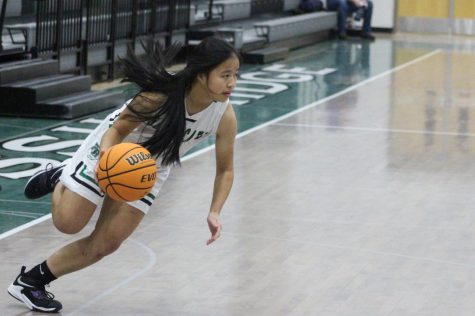
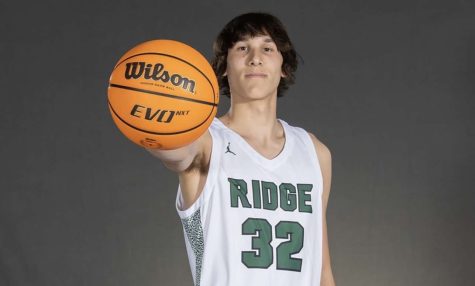
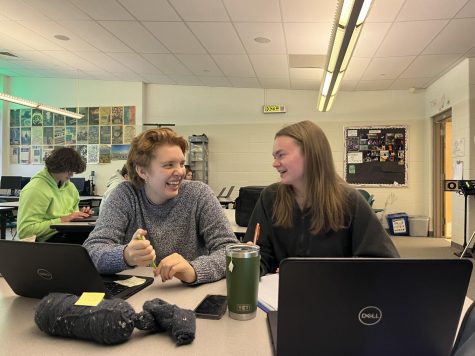
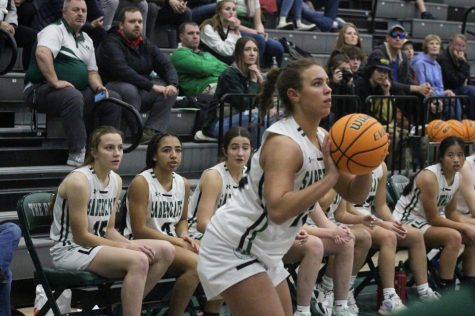
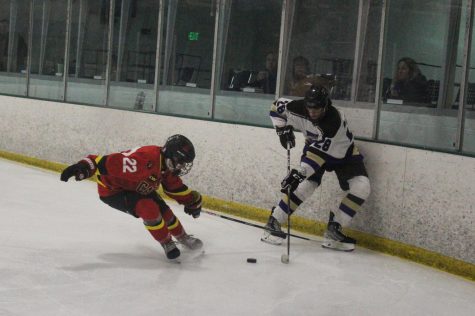

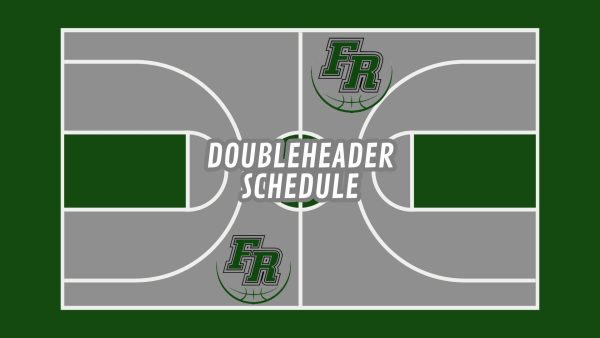
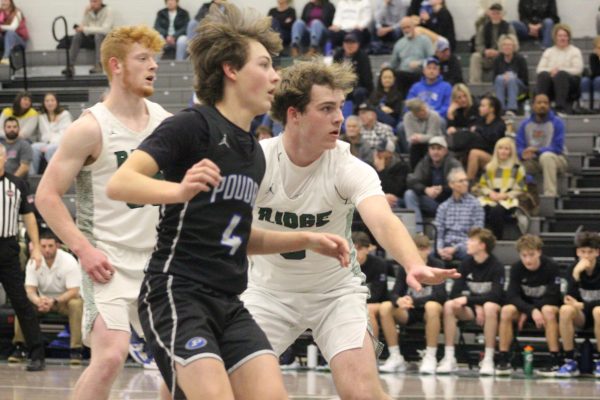
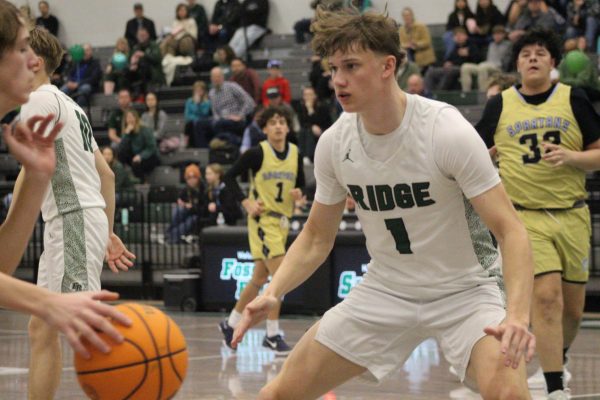

JP • Feb 23, 2022 at 12:40 pm
ABOUT TIME 👏🏻
AG • Feb 23, 2022 at 11:39 am
WOOOO BRUNA!
Rishabh Cowlagi • Feb 22, 2022 at 2:17 pm
cool artlicle